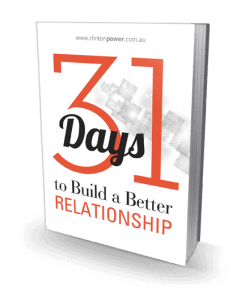Warning: The 5 Most Common Ways Gay Men Sabotage Their Relationships
As a gay man, you probably have a really good idea about what you DON’T want in a relationship. You may have experienced at least one and perhaps several bad relationship experiences that have influenced the ‘don’t wants’ in your relationships.
Some gay men have a checklist either mentally or written down about what it is they want in their partner and how the partner can satisfy them. Or they may have more positive checks on their list but stop moving towards someone they are interested in because of one negative aspect and end up in shallow relationships. Some men also sabotage every potential relationship by ignoring any of their misgivings about the other person.
Whatever way you decide you want in a relationship you may be consciously or unconsciously sabotaging a potentially intimate relationship.
Here are some of the most common sabotage strategies of gay men:
- Not saying what they want from fear of rejection, hurting the other or being alone.
- Not trusting the other person but continually testing their loyalty and honesty by checking their phone for messages, calls, emails and access to any online gay sites such as ‘Grindr’.
- Focusing on the past relationship and preventing any intimacy between men in the present.
- Being defensive, critical and blaming the other rather than taking responsibility for their part in a disagreement.
- Not allowing the other their independence in the relationship – always having to do everything together – making statements such as “You don’t love me”.
- Not taking responsibility for a shared relationship by being dependent on the other to make all the decisions, being passive and going along with everything the other decides.
- Low self-esteem and confidence by always putting themselves down and being ‘less than’ others attitude.
- Having a belief system of punishment that doesn’t allow for positive encouragement but only negative reinforcement.
- Using sex as a form of intimacy without emotionally connecting.
- Differences in communication styles – “I’m emotional you have to be also”.
- Being controlling and considered rather than being spontaneous.
- Expecting to be rejected like you may have been by your family and friends and then re-creating this in current relationships.
From the list above there emerges the 5 most common sabotage strategies employed by gay men:
#1 A pessimistic attitude about relationships that keeps you stuck in the same negative cycle
Some men are cynical that the ideal man is just a relationship myth, he doesn’t exist and why bother seeking a relationship as they won’t last. And yet, despite this, many gay men long to connect with other men.
Many gay men experience loneliness, fear of rejection and the emotional pain that comes with having to be vulnerable in a relationship.
Having a checklist based on past experiences and beliefs adds to the distancing. Does your belief or attitude sabotage the potential for having a relationship? What beliefs hold you in a negative belief cycle and what beliefs free you to be in a gay relationship?
#2 Staying safe from emotional vulnerability by not asking for what you need and want
One of the most common causes of relationship breakdown is attributed to communication differences. Hard to believe when we live in an information superhighway.
Rather than stay in vulnerability when miscommunication occurs each part of the relationship defends. A power play emerges. No one wants to relinquish or submit as each has something important to communicate – the other just doesn’t want to hear.
Not listening effectively, understanding what you want to communicate, how you are communicating and how you expect your partner to communicate with you can sabotage the best of relationships and stop new ones from forming. What’s your communication style and what do you need from your partner when you communicate with him?
#3 Being stuck in the past affects being in the present and moving into a positive future
Many gay men live in the past rather than being present to what is happening around them today. It stops them from being future focussed – they want a guarantee that the new relationship won’t be like the last one.
They begin the search for the ‘Holy Grail’ – the perfect partner only to find greater disappointment, loneliness, and rejection – sometimes losing a sense of who they are and what they want from life and in a relationship.
Being present-focused requires being present to how you are feeling and experiencing your life today. Breaking the cycle of past disappointment is the key to living in the present and being future-focused. Are you so focused on past bad experiences that you are not willing to take a risk? How does this thinking sabotage your relationships?
#4 Family dynamics and relationships teach you how to be in relationship
Being part of a family teaches and demonstrates the level of emotional intimacy, the rules of life including the rules of relationship, even if by osmosis.
Most people find that somewhere in their life they begin to accept, reject or change what they have learned from their family. A family is highly influential on the internal template that tells you how to be in a relationship.
Having parents who have a healthy relationship helps you to develop emotional intimacy and closeness, in other words, you understand the difference between healthy and unhealthy boundaries.
Everyone creates strategies to feel safe and develop trust. Knowing how a potential partner and how you have navigated the family dynamics sets up a whole host of reactions, both positive and less positive. The trick is to know what is a healthy boundary and what are unhealthy boundaries. How rigid or flexible are your boundaries and are they healthy or unhealthy? Does your lack of boundaries or over-development of boundaries sabotage your relationship?
#5 Your lack of belief in yourself sabotages intimacy with other men
Finally, an important strategy is having a lack of self-belief and self-confidence that you are a desirable and loving person who deserves to enjoy a loving relationship.
Gay men often struggle to define themselves in a straight world. You may have experienced stigma, bullying, being secret, lack of validation while simultaneously having to find understanding and acceptance of yourself while painful emotional wounds stop you from embracing care and love from another man.
The struggle to know oneself is a lifelong achievement and what better way to know yourself is to be in a relationship with another and also importantly with yourself. Get to know who you really are, what you believe in, not what you are told you are and learn to trust who you are.
Self-loathing sabotages any relationship – are you ready to explore who you really are and create better relationships?

